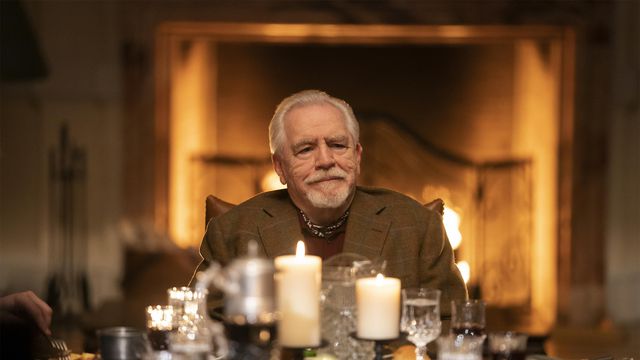[ad_1]

Two very different shows approach the same dark emptiness
This was supposed to be a season of growth for Tim Heidecker on On Cinema at the Cinema. With subscriptions funded by the HEI Network, and supported by his loving wife Toni, Heidecker unveiled one tremendous plan after another — there were Hei Points, which Heidecker described as “the U.S dollar 2.0,” Hei-lot Season, in which his various friends make pilots to run on the network, and perhaps most grandiose of all, the Hei Ranch, which at the moment is 25 acres of sand but will, after a 10-year plan, be a fully functioning society.
Over time, Tim’s plans are wrecked. By the season’s last episode, ostensibly a review of American Underdog: The Kurt Warner Story, Tim is a rambling mess barely able to put two words together. Even the only light in his life, a recent appearance of his once-deceased doctor which Tim is convinced is an angel, has stopped visiting.
Brick by brick, On Cinema viewers watch Tim’s life get destroyed for reasons that are both within and outside of his control. It’s a downfall matched only by one other performance this year: Jeremy Strong’s Kendall Roy on Succession.
Heidecker has been lampooning varieties of masculinity on On Cinema for years now, moving between being a vindictive king like Brian Cox’s Logan Roy and a righteous, crazed, eternal loser like Kendall. Between the two shows, a vicious appraisal of the masculinity at the heart of American media comes shining through.
At first glance, the shows might not have much in common. Succession is the definition of prestige TV, an HBO show filled with big budgets for expensive wardrobes that set Twitter flying (Shiv’s blue dress!) and far-flung locales, not to mention an accompanying podcast hosted by Kara Swisher. It concerns itself with the lives of the Roys, zero-point-zero-zero-one-percenters who run an empire consisting of everything from cable news to theme parks to cruise ships.
/cdn.vox-cdn.com/uploads/chorus_asset/file/23083719/succession_s3_episode_9_kendall_shiv.jpg)
Image: HBO
On Cinema actually started much more modestly, as a podcast between Heidecker and Gregg Turkington, both of whom play twisted versions of themselves on what’s ostensibly a movie review show. Once funded partially by Adult Swim and a Patreon, On Cinema is now entirely crowdfunded. And the basic premise of the show is simple: one of the hosts, Tim, doesn’t really care about movies, while the other, Gregg, only cares about movies. Through this, the two have spun out a complex mythology featuring quack doctors, a deadly EDM festival, and two Italian guys who love rock and roll.
The plots of On Cinema often revolve around Tim’s various schemes, which range from alternative medicinal vaping to starting the rock group Dekkar. But when the HEI Network came into being, the comedy became focused on a new target: Joe Rogan, NewsmaxTV, OANN, and the growing slew of right-wing echo chambers. A huckster eager to sell his own currency and health shake, Heidecker the character wants to strip down his audience for every last dollar with a song and a smile.
The show reboots itself to some extent every season, with Heidecker taking on new forms of masculinity in it’s every changing shapes. There’s a season where Tim moves to Jackson Hole, Wyoming, and embraces riding a motorcycle, simple living, and being pro-life — until his partner has an abortion and he realizes his Jackson Hole friends were white supremacists.
Tim becomes a rock guy, starting a band with the Italian guys Axion and Manuel, Dekkar, which eventually morphs into an EDM act called DKR. He becomes an entrepreneur, opening a movie theater called Six Bags Cinema. He creates the Electric Sun Desert Music Festival, where kids die. He makes a Trumpian ran for District Attorney. Each of these journeys ends with total disgrace, only to find him sinking lower, and in turn coming out with a brand-new messianic high.
/cdn.vox-cdn.com/uploads/chorus_asset/file/23086030/on_cinema_s12.jpg)
HEI Network
Where On Cinema is scattered, Succession is direct. It’s an amalgamation of families with media empires, but it’s most clearly the Murdochs of Fox. Their fictional network, ATN, is clearly a parody of Fox News, with jokes about aging viewers and news anchors getting into a rage about cancel culture; one of this season’s best jokes takes place in the opening credits, with a news chyron reading, “I smiled her by the photocopier — now I’m facing chemical castration.”
Logan seeks only to conquer, which is easy enough if you’re willing to follow Mr. Burns’ advice: “Family, religion, friendship. These are the three demons you must slay if you wish to succeed in business.” Add ignoring a massive sexual abuse scandal in the cruise division. Kendall seeks to rule through some amalgamation of fear and love, and ends up attaining neither. It’s no surprise they’ve destroyed their relationship, and yet they’re stuck with each other, just like the host of a movie review show and the only film buff he knows.
The two shows began working the same question — what is at the heart of people making some of the most popular media today? Their answers include delusion, rage, and a growing isolation from everyone you love. Therapists for billionaires have confirmed that Succession hits close to home, and right-wing streamers spent the year pushing horse dewormer as a COVID cure. Satire isn’t far from reality in either show.
But while there’s no real end to the waking nightmare of modern life in 2021, narrative insists on one. Jesse Armstrong, Succession’s creator, and Tim Heidecker seem to agree on this much: if these things end, they will end poorly. Succession’s brutal finale showed the hopes of the three main Roy children decimated by one of their spouses, call it Succession III: Rise of the Wambsgans. Despite their own respective awfulness, it was hard not to feel a twinge of sympathy for cruel Shiv, creeping fascist Roman, and egotistical Kendall.
In On Cinema, Heidecker moves between the abuser and the abused seamlessly. Mark Proksch (better known these days as What We Do in the Shadows standout Colin Robinson) spends season after season as a victim of Tim’s physical and verbal abuse — at one point Tim declares during a trial “I have a right to strike you!” He regularly destroys Gregg’s collection of VHS tapes, either through magnetization or arson.
“I grew up in Pennsylvania around car dealers, these German, stoic, World War II–generation men, serious men, and masculinity was very strong, and there was not much but boring tendencies to watch sports and drink beer,” Heidecker told The Believer in 2019. “I saw it all around me. Repressed men get very angry.” While they stare at Twitter and stock prices instead of sports, the men on Succession aren’t much different.
/cdn.vox-cdn.com/uploads/chorus_asset/file/23086027/mark_living_oscar_on_cinema.jpg)
All Tim lacks is the Roys’ never-ending font of money. If he could just get that rich, if everyone would just convert their dollars into Hei Points, he believes he would be fine. But Kendall and Logan show what a lie that would be. If you’re set on conquering no matter what, then the world looks like a permanent battlefield. When Kendall rightly points out to Logan that he has no need for the money from Waystar sale, Logan agrees. Except that it doesn’t matter. All that matters is the next win.
The question hanging over Tim, Gregg, the Roys, and everyone unfortunate enough to be dragged into their circles — why can’t they leave? Why do they insist on hating the people closest to them, to embracing the worst aspects of their humanity for money they don’t even need, to making a show about movies where they don’t even talk about movies?
The closest thing to an answer is that they don’t know anything else. They somehow started making money like this and can’t stop now, because the fall would be even worse than anything in front of them. So they’ve convinced themselves this is one true way. All they can do, all they want do, all they must do, is whatever they’ve done over and over again.
[ad_2]
Source link
Sign up for our newsletter now!







